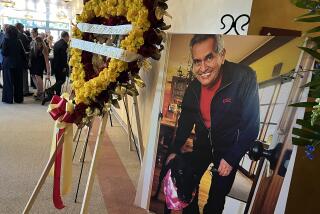Argue Finally Gets Due
- Share via
The man who brought the 1984 Olympics to the Los Angeles Memorial Coliseum has a symbolic permanent home there now. Monday afternoon, they added John Argue’s plaque to Memorial Court of Honor in the building’s peristyle end, in a ceremony attended by about 200 people.
There, Argue joined the likes of people who have, according to John Naber, Olympic gold medalist and master of ceremonies, “distinguished themselves in the history of the Coliseum.” The Court of Honor includes popes and presidents, coaches and players and writers who wrote about them. It memorializes the greatness of John F. Kennedy, as well as the greatness of John McKay.
Argue, a lawyer who died at 70 of leukemia in August 2002, was the ultimate civic booster, passionately pushing the message of his city, his school and the Olympics to all who would listen and all who would help.
His wife, Liz, speaking at the ceremony, said, “We were given a choice of where to locate his plaque, and we picked a spot where he could be looking toward Los Angeles, and looking toward USC, but still see the game on the field.”
Argue, a graduate of Occidental College with a law degree from USC, is the son of Cliff Argue, also a Los Angeles lawyer and a member of the 1924 U.S. Olympic pentathlon team in Paris. From his father, Argue acquired a zeal for the Olympics that fit well with his zeal for civic duties.
For many years, Argue headed the Southern California Committee for the Olympic Games which, after a series of rejections, finally persuaded the International Olympic Committee to bring the Summer Games back to Los Angeles, and to the Coliseum, where they had been held in 1932. But instead of using the occasion to further any individual goals, Argue quickly hired Peter Ueberroth to run the organizing effort.
Barry Sanders, who has taken over from Argue as head of the SCCOG, said Monday that, after leading the effort to get the ’84 Games, Argue wanted “no title and no credit. That’s just the way he was. All he cared about was getting to the goal.”
David Simon, a vice president of the L.A. Olympic Committee and the current president of the Los Angeles Sports Council, said that, in daily dealings with Argue, “there was nothing that you could see that would put him on a pedestal like the other mystical figures in the Coliseum’s peristyle end.” But then, Simon added, the totality of Argue’s achievements made him more than worthy.
Anita DeFrantz, president of the Amateur Athletic Foundation that was created, and flourishes today, thanks to Argue’s negotiated deal that kept 40% of any ’84 Olympic surplus in a local foundation that would “provide bats and balls to the kids,” called him a friend and a mentor. “Your grandchildren and great-grandchildren will benefit from the ’84 Olympic Games,” she said.
That Olympic surplus, as created by Ueberroth’s LAOOC, turned out to be $232.5 million, of which an original $93 million grant to the AAF has created $143 million in local grants to date, with $140 million in working capital left.
Ueberroth, in Switzerland at an IOC meeting in his new capacity of chairman of the U.S. Olympic Committee, had DeFrantz read a message from him that said, among other things, that Argue “had brought equal parts of integrity and passion into the Olympic movement.”
Margaret Farnum, chief administrator for the Coliseum, pointed toward a picture of Argue with an Olympic torch and said, “That is very symbolic. John and his father did that for Los Angeles for all of their lives, carry the torch.”
Sanders said that Argue had been on dozens of boards of directors all over the city for most of his career, and that he usually became chairman of each board shortly after he joined. “He always said, ‘As long as you have to go, you might as well be chairman,’ ” Sanders recalled.
In the last two years of his life, John Argue had been chairman of the USC Board of Trustees. When his plaque was unveiled Monday, members of the USC band played one his favorite songs.
“Conquest.”
More to Read
Go beyond the scoreboard
Get the latest on L.A.'s teams in the daily Sports Report newsletter.
You may occasionally receive promotional content from the Los Angeles Times.







